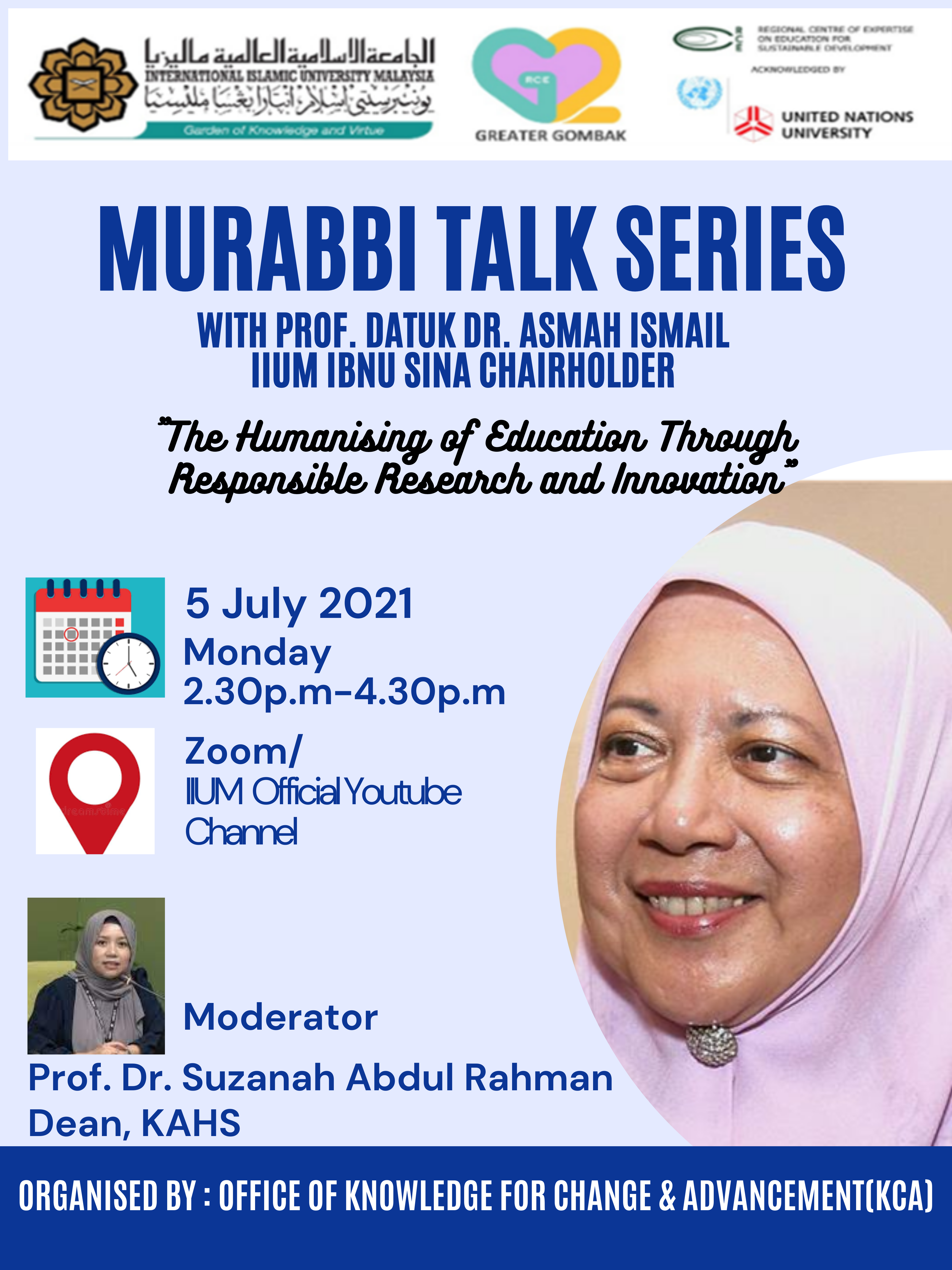By Amilah Awang Abd Rahman
Thank you very much Prof. Datuk Asma Ismail, the Holder for Ibn Sina Chair for an inspiring talk that brings the audience to connect the current scenario with future developments especially with regard to the roles of educators, researchers and academics.
The talk focuses on several issues, mainly on Responsible Research and Innovation (RRI), as well as humanising education in the current development especially with the COVID-19 pandemic. The talk which can be a dry one has turned to be very inspirational with well researched information and data. The crux of the talk was that the pandemic has brought more challenges to the human life, and at the same time has naturally pushed the Responsible Research and Innovation agenda to take place.
The pandemic also enhances the culture of providing rapid answer to problems, many were conducted with global collaborative initiatives. The need for rapid answers to the challenge has created a new culture of publishing pre-printing works rather than the normal way of publishing in proper journals and books. It also pushes everybody on board to enhance collaborative research. In fact, the need of research has become not only the interest of government but also industries.
Professor Datuk also shared her observation that IIUM has been on track with the RRI agenda in terms of direction with the making of Insan Sejahtera and Maqasid Shariah as well as Sustainable Development Goals (SDGs) as part of the universitys planning. Researchers should be aware of the changes that take place and especially to look for highly impactful researches to solve human problems. The ready challenge is the effect of explosive technology that could be harmful to human. Its impact to the humans has opened for vital topics of research.
What really attracts my attention is Professor Datuks phrase œtechnology is advancing faster than policies and œregulations cannot catch up with innovation using disruptive technologies which really express not only about the need for rapid but also real and genuine solutions to the problems.
As an academic member coming from Usuluddin discipline, I can see the potentials of contributing to the agenda but not without challenges. Being the most top part of the umbrella of Islam, its fundamental answers are always vital in assisting other disciplines to craft solutions for problems. When it comes to ˜human-centric issue, IIUM has been on track with its vision of Islamisation in making religion to be relevant to various disciplines as highlighted by our founding father, Tan Sri Professor Emeritus Mohammad Kamal Hassan.
The current experience which pushes for rapid solution pushes another step forward, that demands the initiatives not to work retrospectively in correcting the past theories, but in catering to the current needs if not prospectively, and in making original theories and solutions. Though I admit that the previous initiatives of IOHK was already very challenging, since the discourse on the fundamentals of Islam is dogmatic in nature and more focus to cater purely on philosophical solutions, vital in the history rather than catering to the changes in contemporary human experience, which leaves the field to have a very big gap to bridge. But if successful, it will definitely be novel findings and make real contributions to humanities. After all, good vicegerents of Allah is to creatively solve human problems.
The most interesting part for me is when Professor Datuk emphasised the role of ethics in managing technology created by man rather than letting technology to lead humankind. Ethics should be the most potential tool to control the explosive technologies especially in ensuring them to be really good for human beings. In this complex and uncertain situation, the ethical general principles of good and bad in akhlaq is more valuable and receptive to changes rather than dry rulings.
It is high time for the Islamic moral philosophy to really play a vital role in nurturing critical thinking. It is an important aspect of competency that enabled individuals to face the challenges of technology, as emphasised by Professor Datuk Asma. Surprisingly, its discipline in Islam that receives the least attention among the Islamic disciplines even yet to be properly explored.
Interestingly, the Quranic principles, as attested by prominent thinkers such as Muhammad Abdullah Draz and Taha AbdurRahman, are actually human centric and scientific by nature as well as receptive to philosophical scrutiny. It is also dynamic which can answer to the problem of realism versus idealism, unity versus diversity, as well as God-centric versus human-centric, which is really the looked forward system by the philosophical discourse. Thus, it is indeed a promising area of research and promising platform for high quality education.
All in all, the new developments in human life and experience have harnessed more opportunities to all including those who are from the fields of Islamic studies. The door to provide real solutions, not limiting to barrier of religion or secular is open widely. If this opportunity is taken in a serious manner, this can at least change the perception of Usuluddin as only abstract field. Indeed, it lies the root solutions for the whole mankind.***
(Assoc. Prof. Dr. Amilah Awang Abd Rahman is an academic in the Department of Usul al-Din and Comparative Religion, Kulliyyah of Islamic Revealed Knowledge and Human Sciences. This write-up is adapted from her appreciation speech following the Murabbi Talk Series by Prof. Dr. Asma Ismail recently.)
